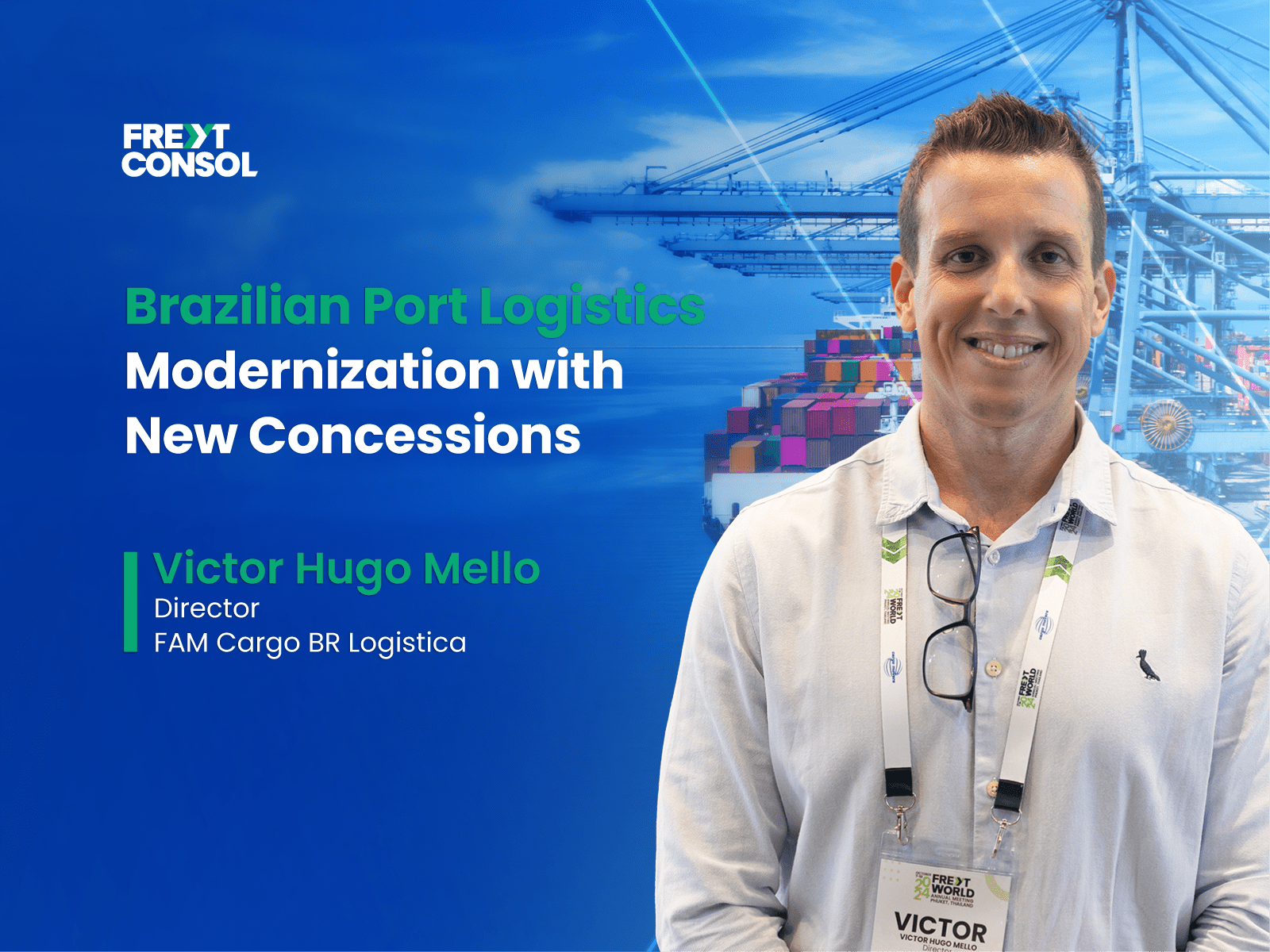By Victor Hugo Mello, Director at FAM Cargo BR Logística

Brazil ended 2024 as the 10th largest economy globally. The country hosts Latin America's second most important port. Brazil maintains a key position in the global economic landscape, with substantial growth potential in its logistics sector.
Recent developments in Brazil's logistics industry include Minister Silvio Costa Filho presenting port concession projects to the Tribunal de Contas da União (TCU). This initiative marks a strategic effort toward Brazilian port logistics modernization. Such modernization proves essential for a nation heavily dependent on maritime trade for commercial operations. The country's economic framework relies on efficient port systems to sustain both import and export activities.
These concessions represent more than infrastructure improvements. They signal Brazil's commitment to enhancing its competitive position in international trade. The government recognizes that modern port facilities directly impact economic performance across multiple sectors.
Concession Projects and Market Impact
The Brazilian government's plan, as outlined in the meeting with the TCU, includes a comprehensive strategy to improve port infrastructure. According to recent reports on www.gov.br, these projects aim to enhance both cargo and passenger transport, boosting logistical efficiency.
The concessions are expected to attract substantial private investment, with projections indicating over R$ 17.28 billion for the Port of Santos alone over the next 25 years.
- Economic Impact: The inflow of private capital into port operations is expected to reduce public expenditure while improving infrastructure. Data from the Ministry of Ports and Airports suggests that these investments could increase port capacity by up to 50% by 2040. This could potentially enable an additional 240.6 million tons of cargo to be handled annually in Santos alone.
- Rate Dynamics: With increased capacity and efficiency, port tariffs could stabilize or even decrease over time, leading to lower logistics costs for Brazilian exporters and importers. Historical data from Alphaliner indicates that more efficient ports can reduce demurrage and detention charges by up to 30%, directly benefiting logistics providers.
Capacity and Operational Efficiency
The Brazilian port logistics modernization goes beyond financial investment, introducing operational improvements as well.
Capacity Analysis: Brazil's ports have been under strain due to outdated infrastructure and operational inefficiencies. The new concessions include provisions for upgrading equipment and technology, which could significantly reduce vessel turnaround times. A study by Drewry found that a 10% reduction in port stay for vessels could result in a 5% increase in throughput.
Market Demand: Brazil's agricultural sector, a major driver of port activity, continues to expand. Projections from the Brazilian Institute of Geography and Statistics (IBGE) estimate a 4% annual increase in output through 2030. This sustained growth requires robust port infrastructure to handle increasing volumes of bulk commodities such as soybeans and iron ore.
While these projections are promising, challenges must also be considered.
Regulatory Hurdles: Obtaining approvals from agencies such as the TCU can be time-consuming, potentially delaying the expected benefits. Past experiences, as reported by Reuters, show that previous concession approvals have taken over a year to clear regulatory hurdles.
Environmental and Social Considerations: Concession projects must also comply with environmental regulations and address community concerns regarding port expansion and operations. The Brazilian environmental agency, IBAMA, plays a crucial role in project approvals, making this an essential but complex step in the process.
Global Trade Conditions: International trade policies and economic conditions, particularly in major markets like China, can influence the success of these concessions. The World Trade Organization's latest forecasts suggest cautious optimism for global trade growth, which will be a determining factor in the success of these initiatives.
Economic Impact and Future Outlook
The concessions introduced by Minister Silvio Costa Filho have the potential to improve port operations in Brazil, ushering in a new phase of logistical efficiency and cost reduction, with positive economic impacts. The Brazilian port logistics modernization could enhance the country's competitiveness in global trade by improving port infrastructure, reducing operational delays, and lowering costs for exporters and importers.
For logistics professionals, this means staying informed on regulatory progress and investment developments. As these changes take shape, businesses should adjust their strategies to capitalize on these improvements. The enhancements to port capabilities will create new opportunities throughout the supply chain.
Brazil's position as a major market necessitates these infrastructure improvements to meet current and future logistics demands. The modernization addresses immediate operational challenges while positioning the country for sustained growth in international trade.
Economic Impact and Future Outlook
Brazil is already a major market, and these improvements are essential to meet the current demands of logistics operations. Brazilian NVOCCs (Non-Vessel Operating Common Carriers) are highly skilled in overcoming local challenges, such as space limitations in ocean freight services. The Brazilian port logistics modernization will provide these specialists with enhanced infrastructure to deliver even more efficient services.
At FAM Cargo BR, the company I co-founded and currently manage, we have been thriving by leveraging strategic planning and offering tailored solutions to our clients. Our experience navigating the complexities of Brazilian logistics positions us to take full advantage of the improved port infrastructure as these projects develop.
The concession projects represent not just infrastructure improvements but opportunities for businesses throughout the logistics sector. Companies that adapt quickly to the changing landscape will find new ways to serve clients more effectively and at competitive rates.
Partnering for Success in Brazilian Logistics
The Brazilian port logistics modernization through concessions represents a transformative development for the country's economy. With projected investments exceeding R$17.28 billion for the Port of Santos alone, these initiatives promise substantial improvements in capacity and efficiency that will strengthen Brazil's position in global trade networks.
While regulatory hurdles and implementation challenges exist, the long-term benefits justify the investment. For logistics professionals, staying informed and adaptable remains crucial as these developments unfold. The modernization creates both challenges and opportunities as the infrastructure evolves.
If you have any shipping needs to or from Brazil and are looking for a reliable partner to ensure your cargo reaches its final destination efficiently, please reach out to me and my incredible team. Visit https://famcargo.com.br/ to learn more about how to get in touch with us.

Freyt Consol Blog Contributor
Freyt Consol is a global network for LCL consolidators and NVOCCs dedicated to excellence and long-term growth. We create an environment where members thrive by collaborating with trusted partners and accessing essential resources.




